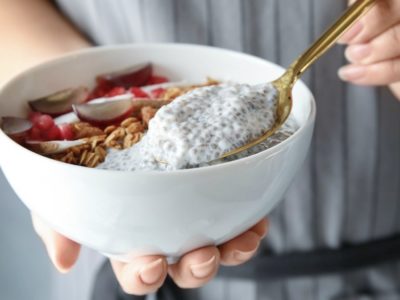Table of Contents[Hide][Show]
Too much protein can hurt your body in more ways than one. Learn how it increases your risk of chronic inflammation below.
How Much Protein Is Too Much Per Day?
To be clear, protein is not the enemy—too much protein is. Proteins are macronutrients, which means the body needs them in significant amounts.
Protein helps build muscles and repair the worn-out ones. The body also uses them to create enzymes, hormones, and other chemicals for metabolism and human survival.
Many parts of the body such as the hair and the nails are protein-based, so you can just imagine what happens to you if you don’t have enough of it.
The problem is you consume more protein than what your body needs. So, how much is too much protein anyway?
It depends on many factors such as lifestyle, age, and weight. For example, the average daily protein requirement is 56 grams for men and 46 grams for women.
If you want to increase muscle size, you may need to boost protein intake a bit. If you are sedentary, you may need less.
Some experts also advise consuming 0.8 grams of protein for every kilogram of your body weight. You get the kilo equivalent by dividing 2.2 to your pound weight.
Here’s a sample computation:
- If you weigh 140 pounds, that’s 63.6 kilograms.
- Multiply 0.8g of protein to 63.6kg, you get 50.9 grams of protein.
- This means your protein allowance is 50.9 grams of protein.
Thus, for the common question “Is 60 grams of protein a day too much?,” the answer is, it depends.
What Does the Body Do with Too Much Protein?

The body uses proteins in specific ways. For instance, it “extracts” amino acids, the building blocks of proteins, for a variety of cellular functions.
Besides the muscles, other body parts or systems also utilize the protein. These include the brain and the heart.
But what happens when you eat too much protein? Where does it go?
When you eat too much protein in a single sitting, the body can store it in the stomach for future use. In other words, it functions as reserves.
When you are critically low in sugar or carbohydrates, you don’t have enough energy source, the body may then convert this protein into glucose.
Proteins also have calories (about 4 calories per gram of protein), and they can provide you with energy and fullness.
Can Too Much Protein Be Harmful?
Anything excessive can be dangerous and having more than enough protein is not an exception. The effects of too much protein are wide-ranging, but they boil down to one thing: inflammation.
Let’s analyze each one of them.
1. Intestinal Inflammation

The small intestine is responsible for metabolizing proteins, among other thing. It, therefore, means it can interact with different microorganisms there and influence their diversity.
In particular, excessive consumption of animal-based proteins may alter the number of bacteria such as Alistipes putredinis. When the bacteria undergoes fermentation, it may release harmful chemicals.
These chemicals can include ammonia and hydrogen sulfide, which can damage the lining of the gut over time. In turn, it leads to bowel-related inflammatory diseases and even a leaky gut.
Related
Prebiotics for a Healthy Gut… and a Healthy You!
Heard about prebiotics but don’t know exactly what they are and what they do in the body? Here’s what you need to know about them, why they are essential to gut health, and how you can easily add them into your daily health regimen.
2. Obesity
Obesity is a complex problem because it’s not as simple as achieving a calorie deficit. Many factors can affect your risk of weight gain.
One thing is clear, though: obesity can promote inflammation in different parts of the body such as the heart and the joints.
Now, can too much protein make you fat? The answer is both yes and no. In the short-term, it may result in weight loss.
In certain instances, the opposite may occur. In this 2016 study, it may happen when you consume more protein as a substitute for carbohydrates.
The research also showed it may promote long-term weight gain and even premature death for people at risk of cardiovascular disease.
3. Gout and Joint Pain

Many people ask, “Can too much protein cause gout, or can too much protein cause joint pain?” The answer to both questions is yes.
Gout is a type of arthritis that develops when crystals lodge themselves in between the joints. These crystals, meanwhile, form when the body has high levels of uric acid.
Uric acid comes from the breakdown of purine, a naturally occurring substance in the body. You may also get it from certain types of food, especially red meat.
The body can remove uric acid through the kidneys, but some may eventually form into crystals. These are the ones that can lead to joint pain and gout.
4. Heart Disease
A particularly dangerous pro-inflammatory protein is c-reactive protein (CRP). CRP is an inflammatory marker checked in blood tests to assess levels of inflammation within the body.
CRP is a big component in the inflammatory process. High CRP levels are a risk factor for heart disease due to the inflammatory response they trigger. Inflammation can cause heart attacks because it leads to blood clots and blocked arteries. Other markers of inflammation are acute phase proteins and pro-inflammatory cytokines.
Some foods to avoid to keep these harmful protein levels low include saturated and trans fats, processed grains, and added sugars.
Foods that lower toxic proteins include fruits, veggies, whole grains, and Omega-3 fatty acids (found in fish, walnuts, chia seeds, and canola oil). These foods are also good for heart health because they help lower blood pressure and cholesterol. The Mediterranean Diet is especially beneficial for including foods that have anti-inflammatory effects.
Will Too Much Protein Hurt Your Kidneys?
This one is controversial as many people assume excessive protein can outright damage the kidneys. It turns out that it may not be the case all the time.
Excessive protein may be harmful to people who already have kidney disease or those at risk of such a condition. These may include individuals who have diabetes or hypertension.
Nevertheless, having too much protein in urine warrants a medical evaluation. It may indicate you have proteinuria, which means you are leaking abnormal amounts of protein into your urine.
It may suggest you have kidney disease. You may not know it yet since it usually doesn’t show symptoms in its earliest stages.
Why Is Too Much Protein Bad for Diabetics?
Contrary to popular belief, some studies showed that higher protein intake may be helpful for people with type 2 diabetes.
It becomes a problem when you are already showing symptoms for diabetic neuropathy. It is a condition wherein high levels of glucose damage your nerves.
Organs such as the kidneys can suffer from nerve damage. In this case, consuming excessive protein can do more harm than good.
Related
Probiotics for Diabetics: How Your Gut Microbiome Helps Maintain Healthy Blood Sugar
Probiotics for diabetics can make a big impact in managing and even preventing this disease. Learn how probiotics help maintain healthy glucose levels and blood pressure, improve insulin sensitivity, promote heart health, and more.
Why Is Too Much Protein Powder Bad?

Some people, especially those engaged in muscle building, increase their intake of protein powder, but it may not be always the best idea.
For one, many of these protein powders may have other ingredients such as additives and sugars. Some of them may even contain toxins that can disrupt the balance of your gut flora, among others.
Protein powders may also have ingredients such as soy, which may not be ideal for those with thyroid disease. Others may include milk products that are not ideal for people with lactose intolerance.
You still need protein, but you should consider getting it from food instead. For example, you can make smoothies out of green blends.
You can still eat meat, but you may want to limit your intake. Otherwise, pick the better option such as grass-fed beef over processed meats.
Final Thoughts
Is too much protein bad for you? Based on these FAQs, overconsumption relative to your body’s needs may lead to inflammation and other chronic diseases.
There are anti-inflammatory drugs and supplements you can talk to your health care provider about, but inflammation is something you can manage with proper diet and nutrition counseling. As you grow older or as your lifestyle changes, adjust your protein intake accordingly.
You May Also Like…
Editor’s Note: This post was originally published on May 27, 2019, and has been updated for quality and relevancy most recently on Oct 28, 2021.






